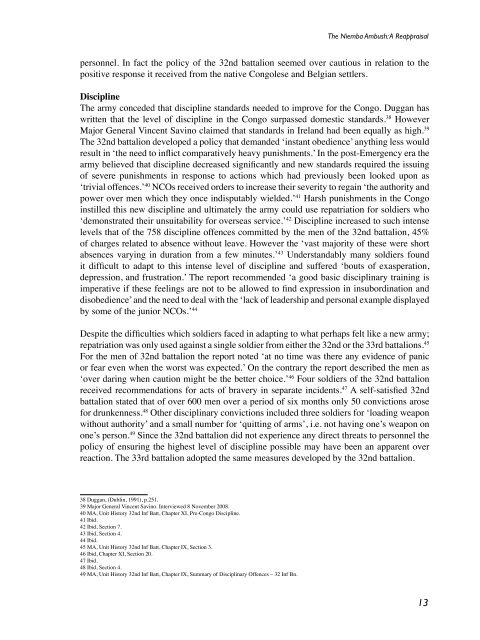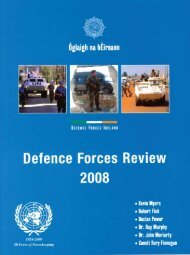The Niemba Ambush: A Reappraisalpersonnel. In fact the policy of the 32nd battalion seemed over cautious in relation to thepositive response it received from the native Congolese and Belgian settlers.DisciplineThe army conceded that discipline standards needed to improve for the Congo. Duggan haswritten that the level of discipline in the Congo surpassed domestic standards. 38 HoweverMajor General Vincent Savino claimed that standards in Ireland had been equally as high. 39The 32nd battalion developed a policy that demanded ‘instant obedience’ anything less wouldresult in ‘the need to inflict comparatively heavy punishments.’ In the post-Emergency era thearmy believed that discipline decreased significantly and new standards required the issuingof severe punishments in response to actions which had previously been looked upon as‘trivial offences.’ 40 NCOs received orders to increase their severity to regain ‘the authority andpower over men which they once indisputably wielded.’ 41 Harsh punishments in the Congoinstilled this new discipline and ultimately the army could use repatriation for soldiers who‘demonstrated their unsuitability for overseas service.’ 42 Discipline increased to such intenselevels that of the 758 discipline offences committed by the men of the 32nd battalion, 45%of charges related to absence without leave. However the ‘vast majority of these were shortabsences varying in duration from a few minutes.’ 43 Understandably many soldiers foundit difficult to adapt to this intense level of discipline and suffered ‘bouts of exasperation,depression, and frustration.’ The report recommended ‘a good basic disciplinary training isimperative if these feelings are not to be allowed to find expression in insubordination anddisobedience’ and the need to deal with the ‘lack of leadership and personal example displayedby some of the junior NCOs.’ 44Despite the difficulties which soldiers faced in adapting to what perhaps felt like a new army;repatriation was only used against a single soldier from either the 32nd or the 33rd battalions. 45For the men of 32nd battalion the report noted ‘at no time was there any evidence of panicor fear even when the worst was expected.’ On the contrary the report described the men as‘over daring when caution might be the better choice.’ 46 Four soldiers of the 32nd battalionreceived recommendations for acts of bravery in separate incidents. 47 A self-satisfied 32ndbattalion stated that of over 600 men over a period of six months only 50 convictions arosefor drunkenness. 48 Other disciplinary convictions included three soldiers for ‘loading weaponwithout authority’ and a small number for ‘quitting of arms’, i.e. not having one’s weapon onone’s person. 49 Since the 32nd battalion did not experience any direct threats to personnel thepolicy of ensuring the highest level of discipline possible may have been an apparent overreaction. The 33rd battalion adopted the same measures developed by the 32nd battalion.38 Duggan, (Dublin, 1991), p.251.39 Major General Vincent Savino. Interviewed 8 November 2008.40 MA, Unit History 32nd Inf Batt, Chapter XI, Pre-Congo Discipline.41 Ibid.42 Ibid, Section 7.43 Ibid, Section 4.44 Ibid.45 MA, Unit History 32nd Inf Batt, Chapter IX, Section 3.46 Ibid, Chapter XI, Section 20.47 Ibid.48 Ibid, Section 4.49 MA, Unit History 32nd Inf Batt, Chapter IX, Summary of Disciplinary Offences – 32 Inf Bn.13
<strong>Defence</strong> <strong>Forces</strong> <strong>Review</strong> <strong>2010</strong>Radio and CommunicationsThe 32nd battalion’s report contained many criticisms of its communications network. Initiallyin the Congo, communications had been described as ‘chaotic’ and in the early period as ‘mostunreliable when working at all.’ Some messages took three days to reach battalion HQ and‘very often they were never delivered at all.’ 50 However one must state that this did not resultfrom incompetence or obsolete equipment. The report noted that the troops were dispersedto extreme distances, ‘B Company at Kindu was a distance of over 300 miles away by roadand two hours flying time by air over dense jungle.’ When one considers that the length ofthe island of Ireland is approximately 300 miles, the domestic army in the pre-Congo eracould not have envisaged the need for radio equipment capable of transmitting such distances.Furthermore such an extreme dispersal ran contrary to the military doctrine of any army, andthe Irish contingent questioned ‘the advisability of splitting up a battalion over such a largehunk of territory in a situation such as existed in the Congo at this time.’ 51 Irish contingentspossessed ‘C.12 wireless sets’, the same radio equipment used by NATO forces at the time. Infact the 33rd battalion did a signal test with a C.12 over a distance of 375 miles and achievedsignal strength of 75%; natural features such as mountains and bad weather reduced the set’stransmission ability. 52 By organising a relay system the 32nd battalion HQ communicatedwith all outposts, ‘the signal officer experimented with these sets from ground to air at longdistances and they worked.’ However the relay system restricted transmissions to one perday. 53 Battalion operators retrospectively described the C.12 as a ‘first class set’ in terms ofrange and reliability, and the ‘3L set’ and the ’88 sets’ as giving ‘perfect communication withthe ground plane aerial’ and as ‘satisfactory.’ 54Aforementioned academics, journalists, and military officers not present or involved inONUC have claimed that the standard of the 33rd battalion’s radio equipment and operatorscontributed to the outcome of the Niemba ambush, by not pre-warning the patrol, and inrelation to the speed and deployment of the search and rescue patrols. Primary evidencecompletely contradicts this because the 33rd battalion’s retrospective assessment stated that‘the reliability of the command net could not be better and communications were possible atall times during the hours of duty of operators. This situation existed right throughout the fulltour of the 33rd battalion.’ 55 An assessment of their communications equipment described‘excellent service’ that ‘worked for the full period almost without giving trouble.’ Furthermoreno shortage of equipment existed; perhaps the experiences of the 32nd battalion ensured the33rd battalion received enough equipment. The 33rd battalion described the fifteen ‘WS 31’sets and the 24 ‘WS 88’ sets as ‘adequate.’ 56 Although the 33rd battalion found itself with‘three times more outposts than the available trained WT operators could properly man,’ asignal unit from the Indian contingent assisted at battalion HQ. 57 As the army’s report noted,the only communications problem existed with the ‘rear link.’ 58 Assistance from the IndianSignal Troop allowed more regular transmissions within the 33rd battalion. 59 Aid from the50 MA, Unit History 32nd Infantry Battalion In The Congo, Section 9.51 MA, Unit History 32nd Inf Batt, Section 10.52 MA, 33 Inf Batt, ‘Signal Section History’, Section 2.53 MA, Unit History 32nd Infantry Battalion In The Congo, Section 9.54 MA, Unit History 32nd Inf Batt, Chapter IX, Section 11.55 MA, 33 Inf Batt, ‘Signal Section History’, Section 3.56 Ibid, Section 4.57 MA, 33 Inf Batt, ‘Operations Section History’ Section 2.58 MA, 33 Inf Batt, ‘Signal Section History’, Section 4.59 Ibid.14
















